
Backgammon is a two-player board game played with counters and dice on tables boards. It is the most widespread Western member of the large family of tables games, whose ancestors date back at least 1600 years. The earliest record of backgammon itself dates to 17th-century England, being descended from the 16th-century game of Irish.
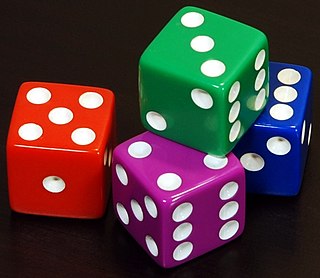
A die is a small, throwable object with marked sides that can rest in multiple positions. Dice are used for generating random values, commonly as part of tabletop games, including dice games, board games, role-playing games, and games of chance.

Yahtzee is a dice game made by Milton Bradley. It was first marketed under the name of Yahtzee by game entrepreneur Edwin S. Lowe in 1956. The game is a development of earlier dice games such as Poker Dice, Yacht and Generala. It is also similar to Yatzy, which is popular in Scandinavia.

Three man is a drinking game played with two dice. It can be played with at least three people but some consider it better with around five.

Pig is a simple die game first described in print by John Scarne in 1945. Players take turns to roll a single die as many times as they wish, adding all roll results to a running total, but losing their gained score for the turn if they roll a .
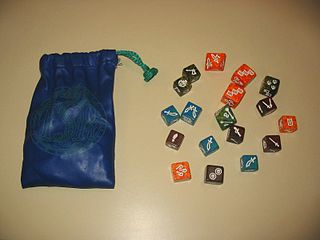
Dragon Dice is a collectible dice game originally made by TSR, Inc., and is produced today by SFR, Inc. It is one of only a handful of collectible dice games produced in the early 1990s. The races and monsters in Dragon Dice were created by Lester Smith and include some creatures unique to a fantasy setting and others familiar to the Dungeons & Dragons role-playing game.

Cee-lo is a gambling game played with three six-sided dice. There is not one standard set of rules, but there are some constants that hold true to all sets of rules. The name comes from the Chinese Sì-Wŭ-Liù (四五六), meaning "four-five-six". In America it is also called "See-Low," "Four-Five-Six," "The Three Dice Game," "Roll-off!," and by several alternative spellings, as well as simply "Dice." In China it is also called "Sān Liù Bàozi" (三六豹子), or "Three-Six Leopards". In Japan, it is known as "Chinchiro" (チンチロ) or "Chinchirorin" (チンチロリン).

Acey-deucey is a table game, a family of board games that includes backgammon. Since World War I, it has been a favorite game of the United States Navy, Marine Corps, and Merchant Marine. Some evidence shows that it was played in the early 1900s aboard U.S. Navy ships. The game is believed to be rooted in the Middle East, Greece, or Turkey, where there were variants in which the game started with pieces off of the board.
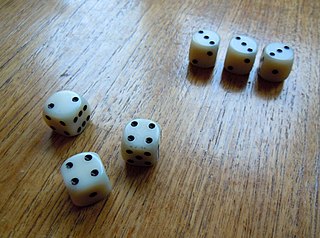
Farkle, or Farkel, is a family dice game with varying rules. Alternate names and similar games include Dix Mille, Ten Thousand, Cosmic Wimpout, Chicago, Greed, Hot Dice, Volle Lotte, Squelch, Zilch, and Zonk. A version has been marketed commercially since 1996 under the brand name Pocket Farkel by Legendary Games Inc. The game is believed to have arrived on French sailing ships in the 1600s, and has been passed down in families as a folk game ever since. As such, while the basic rules are well-established, there is a wide range of variation in scoring and play.
Dice chess can refer to a number of chess variants in which dice are used to alter gameplay; specifically that the moves available to each player are determined by rolling a pair of ordinary six-sided dice. There are many different variations of this form of dice chess. One of them is described here.
Don't Go to Jail is a 1991 Parker Brothers dice game for two or more players inspired by Monopoly. The game is played by rolling ten dice and attempting to roll matches to score points.
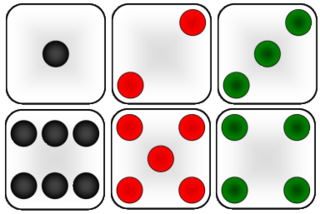
Kismet is a commercial dice game introduced in 1964. The game's name is the Turkish word for "fate". E. William DeLaittre holds the trademark on the game, which was originally published by Lakeside Games, and which is currently produced by Endless Games. Marketed as "The Modern Game of Yacht", the game play is similar to Yacht and Yahtzee, with a few variations. A primary distinction is that in Kismet, the sides of the dice have different colored pips.

Ship, Captain, and Crew is a drinking game played with five dice. The game can be played with as few as two people but is usually played in a group of five or more. The object of the game is to roll a six, a five ("captain"), and a four ("crew") with three dice, and get the highest score with the other two dice. In other versions, a four is the "mate" and the remaining dice are the crew.
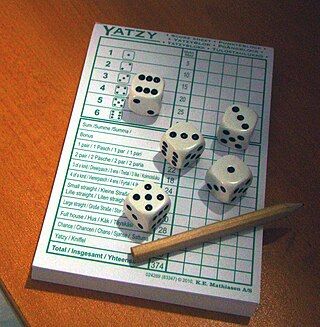
Yatzy is a dice game similar to Yacht and Yahtzee. It is related to the Latin American game Generala and the English game of poker dice. Yatzy is most popular in the Nordic countries.

Generala is a dice game similar to the English game of poker dice, the German game Kniffel, and the Polish game Jacy-Tacy (yahtzee-tahtzee). The American variant of Generala, Yahtzee, is the most popular variant. Although it is sometimes played in Europe and the United States, Generala is most popular in Ibero-America.
A number of related games under the Yahtzee brand have been produced. They all commonly use dice as the primary tool for game play, but all differ generally. As Yahtzee itself has been sold since 1954, the variants released over the years are more recent in comparison, with the oldest one, Triple Yahtzee, developed in 1972, eighteen years after the introduction of the parent game.

The Mutschel is a traditional star-shaped bread from Reutlingen, Germany. The pastry, and the corresponding Mutscheltag, have probably existed since the 13th century. Mutscheln are roughly star-shaped and come in various sizes: usually approximately six inches in diameter, but bakeries often offer breads three or more feet in diameter. The most common Mutschel is made of wheat, yeast, a small amount of fat like lard or butter and eggs. They are sometimes made in sweet varieties.

Midnight is a dice game played with six dice.

Cacho Alalay is a popular dice game from Latin America. It is similar to Yahtzee/Yatzy. The purpose of the game is to roll five dice and score points from their combinations. The dice are rolled from a leather cup.
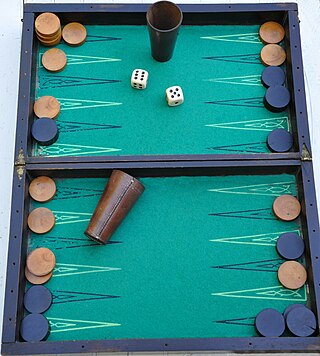
The following is a glossary of terms used in tables games, essentially games played on a Backgammon-type board. Terms in this glossary should not be game-specific, but applicable to a range of tables games.


















